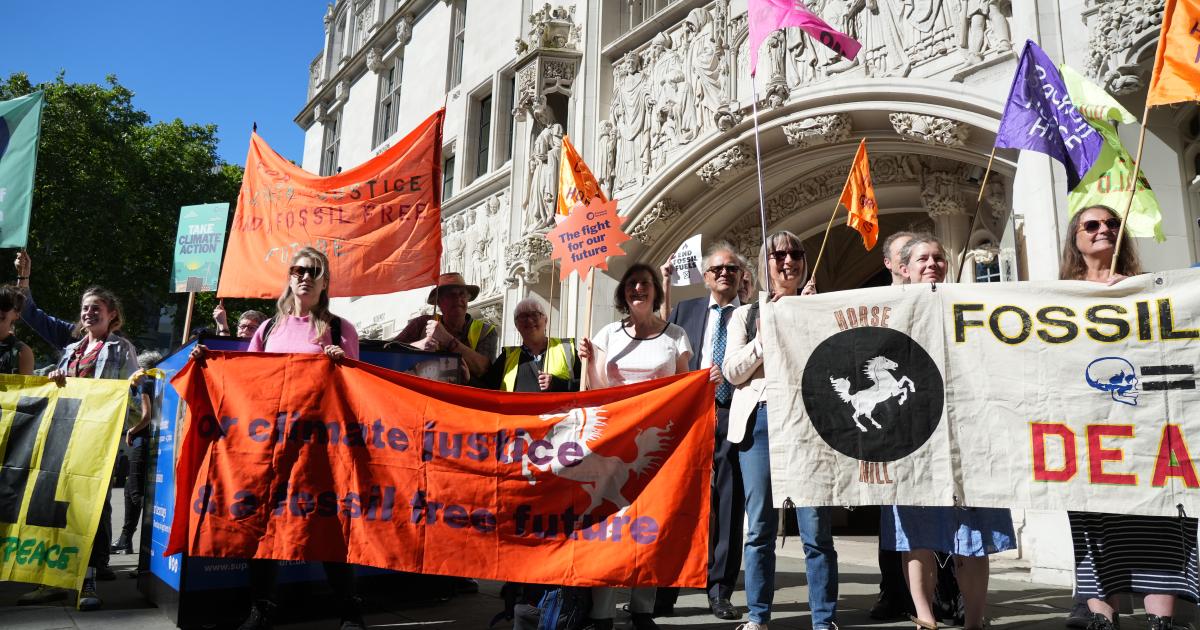
Surrey County Council acted unlawfully by giving planning permission for oil production at Horse Hill in the Surrey countryside without considering the climate impacts when the oil is inevitably burned, the Supreme Court has ruled today.
Planning permission for four new oil wells and 20 years of oil production at Horse Hill will now be quashed.
The landmark judgment follows a legal challenge against Surrey County Council’s decision to grant planning permission for oil drilling at Horse Hill, near Gatwick airport in the Surrey countryside.
The case was brought by former Surrey resident Sarah Finch, on behalf of the Weald Action Group, and supported by Friends of the Earth.
It could have enormous impacts on all new UK fossil fuel developments – including proposals for a new coal mine in Cumbria and North Sea oil and gas projects.
Not included
Finch argued that the environmental impact assessment carried out by Surrey County Council – which declared a climate emergency in 2019 – should have considered the climate impacts that would inevitably arise from burning the oil, known as ‘Scope 3’ or ‘downstream’ emissions.
More than 10 million tonnes of carbon emissions would be produced from burning the oil, but this was not included in the environmental impact assessments.
Scope 3 emissions are increasingly being left out of environmental impact assessments when planning applications are made for fossil fuel projects, including plans for a new coal mine on Cumbria and new North Sea oil developments, despite the huge impact they would have on the escalating climate crisis.
Justice Leggatt said: “I do not accept the premise that it would be wrong for a local planning authority, in deciding whether to grant planning permission, to take into account the fact that the proposed use of the land is one that will contribute to global warming through fossil fuel extraction.”
‘Heavy blow’
FoE called the ruling “groundbreaking”, and “a heavy blow” for the fossil fuel industry. The judgment is very clear that the inevitability of the end-use emissions of this oil project meant they were indirect effects of the development, and so needed to be factored into the environmental impact assessment, FoE pointed out in a statement.
Friends of the Earth lawyer Katie de Kauwe said: “This historic ruling is a watershed moment in the fight to stop further fossil fuel extraction projects in the UK and make the emissions cuts needed to meet crucial climate targets. It is a huge boost to everyone involved in resisting fossil fuel projects.
“Gas, oil and coal companies have been fighting tooth and nail to avoid having to account for all the climate-harming emissions their developments cause,” she said.
Developers of the Whitehaven coal mine and the Rosebank oil field in the North Sea also did not provide information on downstream emissions in their environmental statements.
- SEO Powered Content & PR Distribution. Get Amplified Today.
- PlatoData.Network Vertical Generative Ai. Empower Yourself. Access Here.
- PlatoAiStream. Web3 Intelligence. Knowledge Amplified. Access Here.
- PlatoESG. Carbon, CleanTech, Energy, Environment, Solar, Waste Management. Access Here.
- PlatoHealth. Biotech and Clinical Trials Intelligence. Access Here.
- Source: https://theecologist.org/2024/jun/20/watershed-moment-against-fossil-fuels-supreme-court-ruling
